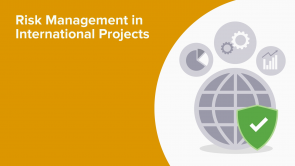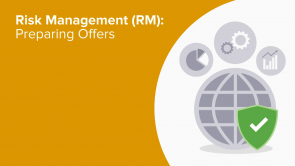Risk Management Definition & Fundamentals

About the Lecture
The lecture Risk Management Definition & Fundamentals by Simone Hoferer is from the course Risk Management in International Projects. It contains the following chapters:
- Objective of this chapter
- Definition of risk & project
- Correlation between risk and project
- Purpose of risk management
- Résumé
- Risk Management process itself
- Conclusion
Included Quiz Questions
What is a risk?
- A risk is an event in the future whose outcome in its consequence is insecure (positive or negative).
- A risk is always a future danger or problem.
- A risk is an event which has already taken place.
- A risk is an incident for which one should effect an insurance.
What is a project?
- A project is a specific, goal oriented, one time enterprise which will take place in the future and has to fulfill versatile requirements.
- A project is a specific, goal oriented, recurring enterprise which will take place in the future and has to fulfill versatile requirements.
- A project is an enterprise which consists mainly of standard procedures but requires more resources than usual.
- A project is an undefined enterprise which will take place in the future and will require tremendous amounts of money to be accomplished.
Projects are by their very nature fraught with risks. The function of risk management therefore is...
- to identify potential dangers in order to take appropriate precaution measures to reduce the probability or the impact on the project.
- to support and protect management just in cases of crises or major problems.
- to help finding and selecting the most appropriate insurances for potential dangers.
- not to burden project management with wasting already scarce resources and should only be conducted if time is available.
Project fail due to risks which…
- were lacking of understanding.
- were ignored or not taken seriously enough.
- were lost out of sight.
- were identified or realized.
- were estimated.
What can you do to conduct risk management?
- Check acutely into the project and look for risks and opportunities.
- Evaluate the identified risks and chances.
- Consider how to deal with them.
- Take care that appropriate measures are being taken.
- Communicate with all parties that there is no expected risk due to the risk management.
What are the correct steps of a risk management process?
- 1. RM-Planning, 2. Identification, 3. Assessment & Evaluation, 4. Action Planning, 5. Controlling & Monitoring, 6. Communication
- 1. Communication, 2. Identification, 3. Assessment & Evaluation, 4. Controlling & Monitoring, 5. Action Planning, 6. RM-Planning
- 1. RM-Planning, 2. Identification, 3. Evaluation, 4. Communication, 5. Controlling & Monitoring, 6. Prevention
- 1. RM-Planning, 2. Specify Requirements, 3. Assessment & Evaluation, 4. Action Planning, 5. Controlling & Monitoring, 6. Communication
Customer reviews
5,0 of 5 stars
| 5 Stars |
|
1 |
| 4 Stars |
|
0 |
| 3 Stars |
|
0 |
| 2 Stars |
|
0 |
| 1 Star |
|
0 |
1 customer review without text
1 user review without text
Excerpts from the accompanying material
... of chapter 2: Learning the basics of ...
... result or outcome in a positive or negative way in regard to minimum one project. Aim like costs, time, quality or performance. ...
... a certain likeliness in %. Additionally there is a given uncertainty regarding ...
... nonrecurring enterprise consisting of a set of coordinated, directed operations with a defined starting and closing date. It ...
... projects forward is to be understood in regard of a timeline (into the ...
... an enterprise which is: Specific, nonrecurring = unique, goal-oriented = purposeful. In ...
... change requirements environment people today: Goal ...
... us? If a project as per it´s specific characteristics is risk-entailing anyhow ...
... outcome of events: Minimize or even eliminate the implications on the project, prepare us for upcoming ...
... Purpose of risk management, chance ...
... influence given situations and risks towards ...
... ignored or not taken seriously enough, were underestimated, were neglected, were lost out of sight ...
... of something ever possible to happen at all. And to capture these situations will be ...
... the most important basic requirements for successful project and risk management ...
... or services). In fact rather even more to consider the overall context and the ...
... the project and look out for risks and opportunities as well. Evaluate the identified risks and chances ...
... common sense and the awareness that it is worthwhile to engage ...





